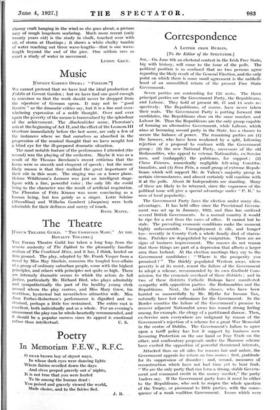Music
[COVENT GARDEN OPER.t. : " FIDELIO.'] WE cannot pretend that we have had the ideal production of Fidelio at Covent Garden ; but we have had one good enough to convince us that the work should never be dropped from the repertoire of German opera. It may not be " good theatre " as the dramatic critics say, but it is a fine and over- whelming expression of a noble thought. Over and over again the poverty of the means is transvalued by the splendour of the achievement. The Abseheuticher scene, Florestan's aria at the beginning of Act H, and the effect of the Leonora III Overture immediately before the last scene, are only a few of the instances where we find ourselves so absorbed in the progression of the musical thought that we have nought but a blind eye for the ill-prepared dramatic situation.
The most notable feature of the performance I attended (the second) was the playing of the orchestra. Maybe it was as a result of Sir Thomas Beecham's recent criticism that the horns were so smooth and eloquent of speech ; but the more likely reason is that they realized the great importance of their role in this score. The singing was on a lower plane. Helene Wildbrunn's Leonora was just an intelligent stage- figure with a fine, powerful voice ; the only life she could bring to the character was the result of artificial respiration. The Florestan of Fritz Krauss was more convincing as a human being, but less gainly as a singer. Lotte SchOne (31arcellina) and Wilhelm Gombert (Jacquino) were both admirable for their deftness and surety of touch.
BASIL MAINE.






































 Previous page
Previous page